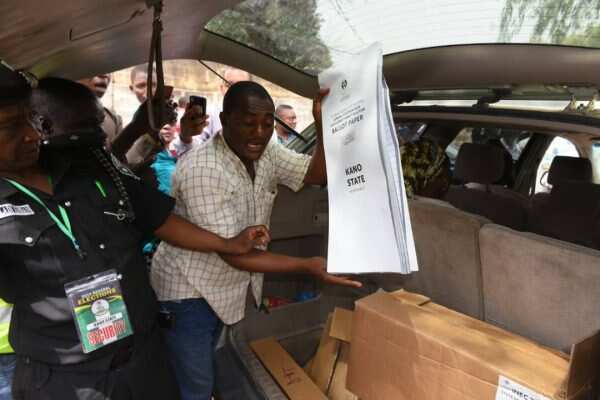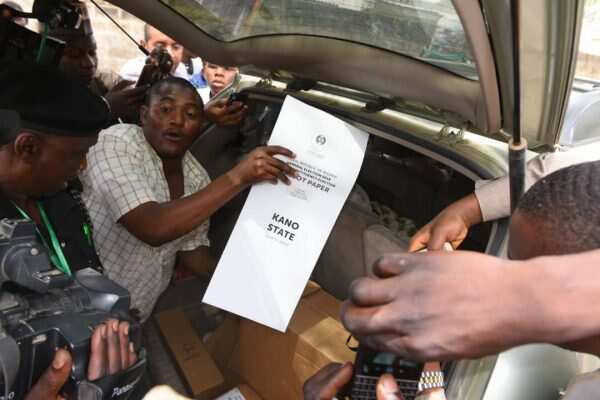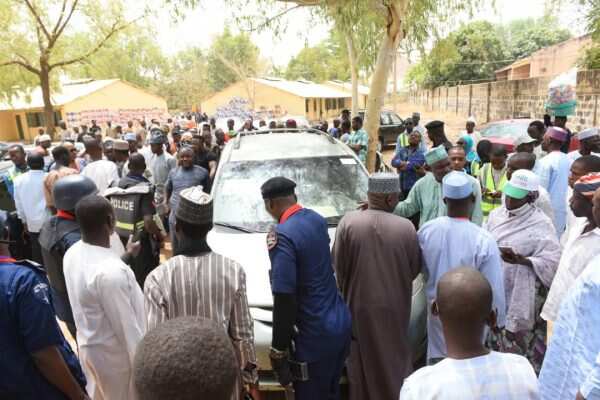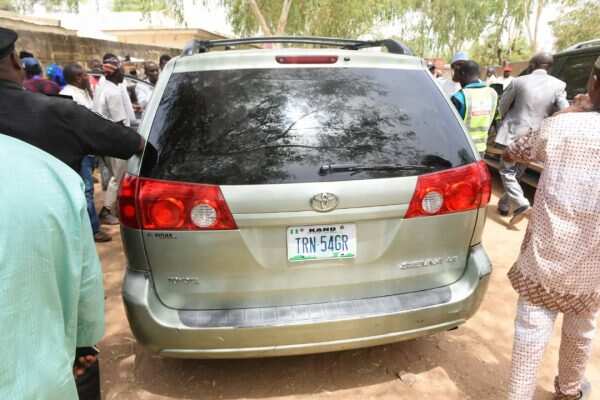- A Sienna with registration number TRN 54 GR loaded with thumb printed ballot papers has been intercepted by the police in Kano
- The vehicle intercepted at Magwan Polling Unit has been moved to the police command
- Investigation has commenced to ascertain whether the ballot papers are genuine or not
Police in Kano state on Saturday, March 9, intercepted a vehicle loaded with thumb printed ballot papers in Kano metropolis.
The police public relations officer, DSP Haruna Abdullahi, confirmed the arrest of the vehicle in an interview with the News Agency of Nigeria (NAN) in Kano on Saturday.
He said the vehicle was intercepted at Magwan Polling Unit at Magwan Primary School in Nassarawa local government area of the state.
READ ALSO: Nigeria Decides 2019: Live updates of governorship and state assembly elections

The vehicle loaded with ballot papers was found at Magwan primary school ward. Photo Credit: Daily Trust
Source: UGC
According to him, the Divisional Police Officer from the local government area reported the matter and he was directed to move the vehicle to the police command.

The car with the ballot papers was intercepted by the police. Photo Credit: Daily Trust
Source: UGC
He said the vehicle was under the police custody and investigation had commenced to ascertain the persons behind the act so that they could be prosecuted.

The Magwan primary school ward is the Kano state deputy governor Nasir Yusuf Gawuna's ward. Photo Credit: Daily Trust
Source: UGC
"Yes, it is true a vehicle was intercepted with ballot papers around 12 noon and it is now with the police at the state CID. The investigation will reveal whether the ballot papers are genuine or not,” the police spokesman said.
Eye witness told the News Agency of Nigeria (NAN) the vehicle, a Sienna with registration number TRN 54 GR, was allegedly arrested along with five others occupants of the vehicle.

The Sienna with registration number TRN 54 GR has been taken into police custody. Photo Credit: Daily Trust
Source: UGC
READ ALSO: Ex-president Jonathan, wife vote in Otuoke
The eye witness alleged that 5,000 of the intercepted ballot papers were for governorship election, while 2,500 were for the state assembly election.
Meanwhile, in an earlier report, operatives of the Economic and Financial Crimes Commission were said to have intercepted bags of cash meant for vote-buying at North Bank Area, Makurdi, Benue state.
The anti-graft agency said in an attempt to arrest the culprits, some thugs attacked the agency's operatives and vandalised the bus used for patrol.
Will the result of the presidential election have an effect on the guber polls? On Legit TV
Source: Legit.ng
from Nigeria News today & Breaking Naija news ▷ Read on Legit.ng 24/7 https://ift.tt/2J2kg3X
via EDUPEDIA24/7
Comments
Post a Comment